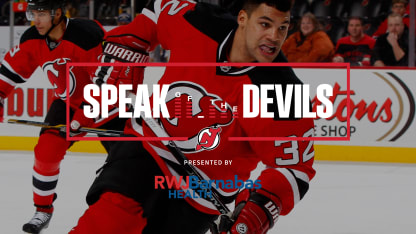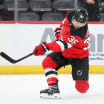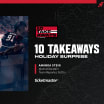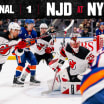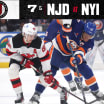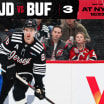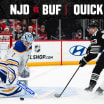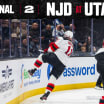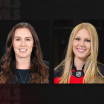PAST DEVILS PODCASTS
SPEAK OF THE DEVILS PODCAST
Dennehy Making Most of Time in Jersey
Salvador and Vilgrain Join the Podcast
Bratt on Returning to Jersey
Niedermayer Figuring Out Retirement
Special Doc Emrick Episode
Behind the Scenes and Behind the Bench
2020 in Review, 2021 Preview
Best Conversations of 2020
In addition to being drafted in his hometown, Fraser made his NHL debut in Ottawa as well. Fraser was playing for the Devils AHL affiliate when he was called up. When his coach called him over to tell him the good news, Fraser thought he was going to be a healthy scratch that night.
"He called me over and said 'pack your bags. You got called up, there was an injury and you need to get up to Jersey.' So I'm in the locker room afterwards, packing my gear as other guys are hanging up their gear for the game that evening."
As Fraser was discussing his call up with his teammates, they figured out that the Devils next game was on the road in Ottawa.
"I was like, hold on. There's 29 other teams, places I could be playing my first game and we're going to Ottawa."
Later that night, Fraser was having dinner with his family the night before his NHL debut. A day later, dozens of family members and friends watched him achieve his dream of playing in the NHL.
Fraser's father was a Canadian Olympic sprinter and was a role model for his throughout his career. He often looked to his dad for advice with everything from being an athlete and the pressures that come with it. He also looked to his dad for advice about being a Black player in a predominantly white sport.
"He taught me a lot about being a Black hockey player as well," said Fraser. "He wasn't in the same sport that I was, in the sense where I was very much a visible minority, but [his] words of wisdom that he would have given me the tough times in my career were. As minorities, a lot of times you have to work twice as hard for half the chance and having a father who's who got that message from his father."
Fraser has involved himself with several projects following his hockey career. One of which is a clothing line with designs focused on his community back home. A portion of the profits go to help underprivileged groups pay their youth hockey fees. Another project is a documentary focusing on the journey of several prominent Black hockey players from the Toronto suburb, Scarborough.
"All these guys are my generation from Scarborough. Very humble beginnings, defying a lot of the odds all made it and had very significant careers in the NHL but not without withstanding a lot of grief, hardships, and prejudice along the way. And because of that I wanted to focus on them to share their story. To really highlight the community of Scarborough, highlight what they've been able to do and showcase what they've been able to do against such troubling odds."
Fraser continues to speak out for racial justice and for equality within the sport of hockey. He wrote a powerful first-person essay in 2020 about what it was like being a Black player in the league and what he needs white players to do to help bring meaningful change.
"This isn't about trying to tear down the foundation of a sport like hockey. And it's not about any of that. We're talking about societal and humanitarian issues here," said Fraser. "You can't win a hockey game if you have players that all do the exact same thing. You need different positions and different awareness and different skill sets. It's no different in any walk of life. We'll be better together if we can form more color across our platform."
